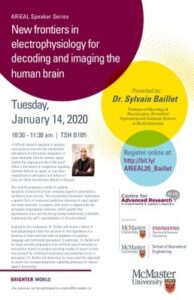By Dr. Sylvain Baillet, January 14, 2020, 10:30 – 11:30 pm
ARiEAL is pleased to invite Dr. Sylvain Baillet to present a talk at the ARiEAL Speaker Series in January 2020. Dr. Sylvain Baillet is Professor of Neurology & Neurosurgery, Biomedical Engineering and Computer Science at the Montreal Neurological Institute, and holds the Tier-1 Canada Research Chair in Neural Dynamics of Brain Systems at McGill University. His main research contributions are in neuroimaging methods and multiscale, quantitative electrophysiology, with emphasis on magnetoencephalography (MEG) for time-resolved brain imaging, with transfers to EEG. He has initiated impactful open-source software developments (Brainstorm), efforts for data harmonization (MEG-BIDS) and data sharing (the Open MEG Archive/OMEGA). As program leader, Dr. Baillet founded 2 MEG core units in Canada and the US and was Director of the McConnell Brain Imaging Centre at the MNI in 2013-17. He has recently been nominated Associated Dean, Research, of McGill’s Faculty of Medicine.

Expandable List
A difficult research question in systems neuroscience concerns the mechanistic elucidation of information integration in brain networks: How do sensory inputs modify the ongoing activity of the brain? What is the nature of competitive signaling between bottom-up inputs vs. top-down modulations in perception and behavior? How are these mechanisms altered in disease?
We recently proposed a model of systems dynamics in hierarchical brain networks based on polyrhythmic oscillatory brain activity. This mechanistic framework implements a generic form of contextual predictive inference of input signals into brain networks. In essence, this vision is aligned with the principles of perceptual inference, which predict that spontaneous brain activity during resting wakefulness constantly implements the self’s representation of its environment.
Inspired by this framework, Dr. Baillet will review a series of neurophysiological data that account for this hypothesis in a diversity of brain functions with an emphasis on auditory, language and multimodal perception. In particular, Dr. Baillet and his team recently proposed to train artificial neural networks on naturalistic stimuli to produce encoding models of neural activity that account for contextual uncertainty and prediction errors in perception. Dr. Baillet will show how his team used this approach to reveal the corresponding brain signaling pathways for natural speech processing.

